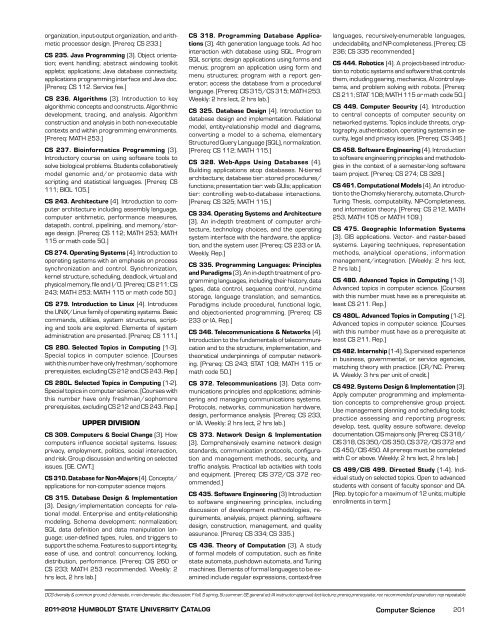2011-12 Academic Year - Bad Request - Humboldt State University
2011-12 Academic Year - Bad Request - Humboldt State University
2011-12 Academic Year - Bad Request - Humboldt State University
You also want an ePaper? Increase the reach of your titles
YUMPU automatically turns print PDFs into web optimized ePapers that Google loves.
organization, input-output organization, and arithmetic<br />
processor design. [Prereq: CS 233.]<br />
CS 235. Java Programming (3). Object orientation;<br />
event handling; abstract windowing toolkit<br />
applets; applications; Java database connectivity;<br />
applications programming inter face and Java doc.<br />
[Prereq: CS 1<strong>12</strong>. Service fee.]<br />
CS 236. Algorithms (3). Introduction to key<br />
algorithmic concepts and constructs. Algorithmic<br />
development, tracing, and analysis. Algorithm<br />
construction and analysis in both non-executable<br />
contexts and within programming environments.<br />
[Prereq: MATH 253.]<br />
CS 237. Bioinformatics Programming (3).<br />
Introductory course on using software tools to<br />
solve biological problems. Students collaboratively<br />
model genomic and/or proteomic data with<br />
scripting and statistical languages. [Prereq: CS<br />
111; BIOL 105.]<br />
CS 243. Architecture (4). Introduction to computer<br />
architecture including assembly language,<br />
computer arithmetic, performance measures,<br />
datapath, control, pipelining, and memory/storage<br />
design. [Prereq: CS 1<strong>12</strong>; MATH 253; MATH<br />
115 or math code 50.]<br />
CS 274. Operating Systems (4). Introduction to<br />
operating systems with an emphasis on process<br />
synchronization and control. Synchronization,<br />
kernel structure, scheduling, deadlock, virtual and<br />
physical memory, file and I/O. [Prereq: CS 211; CS<br />
243; MATH 253; MATH 115 or math code 50.]<br />
CS 279. Introduction to Linux (4). Introduces<br />
the UNIX/Linux family of operating systems. Basic<br />
commands, utilities, system structures, scripting<br />
and tools are explored. Elements of system<br />
administration are presented. [Prereq: CS 111.]<br />
CS 280. Selected Topics in Computing (1-3).<br />
Special topics in computer science. [Courses<br />
with this number have only freshman/sophomore<br />
prerequisites, excluding CS 2<strong>12</strong> and CS 243. Rep.]<br />
CS 280L. Selected Topics in Computing (1-2).<br />
Special topics in computer science. [Courses with<br />
this number have only freshman/sophomore<br />
prerequisites, excluding CS 2<strong>12</strong> and CS 243. Rep.]<br />
UPPER DIVISION<br />
CS 309. Computers & Social Change (3). How<br />
computers influence societal systems. Issues:<br />
privacy, employment, politics, social interaction,<br />
and risk. Group discussion and writing on selected<br />
issues. [GE. CWT.]<br />
CS 310. Database for Non-Majors (4). Concepts/<br />
applications for non-computer science majors.<br />
CS 315. Database Design & Imple mentation<br />
(3). Design/implementation concepts for relational<br />
model. Enterprise and entity-rela tionship<br />
modeling. Schema development: normal ization;<br />
SQL data definition and data manipulation language;<br />
user-defined types, rules, and triggers to<br />
support the schema. Features to support integrity,<br />
ease of use, and control: concurrency, locking,<br />
distribution, performance. [Prereq: CIS 260 or<br />
CS 233; MATH 253 recommended. Weekly: 2<br />
hrs lect, 2 hrs lab.]<br />
DCG diversity & common ground; d domestic, n non-domestic; disc discussion; F fall, S spring, Su summer; GE general ed; IA instructor approval; lect lecture; prereq prerequisite; rec recommended preparation; rep repeatable<br />
<strong>2011</strong>-20<strong>12</strong> <strong>Humboldt</strong> <strong>State</strong> <strong>University</strong> Catalog<br />
CS 318. Programming Database Applications<br />
(3). 4th generation language tools. Ad hoc<br />
interaction with database using SQL. Pro gram<br />
SQL scripts; design applications using forms and<br />
menus; program an application using form and<br />
menu structures; program with a report generator;<br />
access the database from a procedural<br />
language. [Prereq: CIS 315/CS 315; MATH 253.<br />
Weekly: 2 hrs lect, 2 hrs lab.]<br />
CS 325. Database Design (4). Introduction to<br />
database design and implementation. Relational<br />
model, entity-relationship model and diagrams,<br />
converting a model to a schema, elementary<br />
Structured Query Language (SQL), normalization.<br />
[Prereq: CS 1<strong>12</strong>; MATH 115.]<br />
CS 328. Web-Apps Using Databases (4).<br />
Building applications atop databases. N-tiered<br />
architecture; database tier: stored procedures/<br />
functions; presentation tier: web GUIs; application<br />
tier: controlling web-to-database interactions.<br />
[Prereq: CS 325; MATH 115.]<br />
CS 334. Operating Systems and Architecture<br />
(3). An in-depth treatment of computer architecture,<br />
technology choices, and the operating<br />
system interface with the hardware, the application,<br />
and the system user. [Prereq: CS 233 or IA.<br />
Weekly. Rep.]<br />
CS 335. Programming Languages: Principles<br />
and Paradigms (3). An in-depth treatment of programming<br />
languages, including their history, data<br />
types, data control, sequence control, run-time<br />
storage, language translation, and semantics.<br />
Paradigms include procedural, functional logic,<br />
and object-oriented programming. [Prereq: CS<br />
233 or IA. Rep.]<br />
CS 346. Telecommunications & Networks (4).<br />
Introduction to the fundamentals of telecommunication<br />
and to the structure, implementation, and<br />
theoretical underpinnings of computer networking.<br />
[Prereq: CS 243; STAT 108; MATH 115 or<br />
math code 50.]<br />
CS 372. Telecommunications (3). Data communications<br />
principles and applications; administering<br />
and managing communications systems.<br />
Protocols, networks, communication hardware,<br />
design, performance analysis. [Pre req: CS 233,<br />
or IA. Weekly: 2 hrs lect, 2 hrs lab.]<br />
CS 373. Network Design & Implementation<br />
(3). Comprehensively examine network design<br />
standards, communication protocols, configuration<br />
and management methods, security, and<br />
traffic analysis. Practical lab activities with tools<br />
and equipment. [Prereq: CIS 372/CS 372 recommended.]<br />
CS 435. Software Engineering (3) Introduction<br />
to software engineering principles, including<br />
discussion of development methodologies, requirements,<br />
analysis, project planning, software<br />
design, construction, management, and quality<br />
assurance. [Prereq: CS 334; CS 335.]<br />
CS 436. Theory of Computation (3). A study<br />
of formal models of computation, such as finite<br />
state automata, pushdown automata, and Turing<br />
machines. Elements of formal languages to be examined<br />
include regular expressions, context-free<br />
languages, recursively-enumerable languages,<br />
undecidability, and NP-completeness. [Prereq: CS<br />
236; CS 335 recommended.]<br />
CS 444. Robotics (4). A project-based introduction<br />
to robotic systems and software that controls<br />
them, including gearing, mechanics, Al control systems,<br />
and problem solving with robots. [Prereq:<br />
CS 211; STAT 108; MATH 115 or math code 50.]<br />
CS 449. Computer Security (4). Introduction<br />
to central concepts of computer security on<br />
networked systems. Topics include threats, cryptography,<br />
authentication, operating systems in security,<br />
legal and privacy issues. [Prereq: CS 346.]<br />
CS 458. Software Engineering (4). Introduction<br />
to software engineering principles and methodologies<br />
in the context of a semester-long software<br />
team project. [Prereq: CS 274; CS 328.]<br />
CS 461. Computational Models (4). An introduction<br />
to the Chomsky hierarchy, automata, Church-<br />
Turing Thesis, computability, NP-Completeness,<br />
and information theory. [Prereq: CS 2<strong>12</strong>, MATH<br />
253, MATH 105 or MATH 109.]<br />
CS 475. Geographic Information Systems<br />
(3). GIS applications. Vector- and raster-based<br />
systems. Layering techniques, representation<br />
methods, analytical operations, information<br />
management/integration. [Weekly: 2 hrs lect,<br />
2 hrs lab.]<br />
CS 480. Advanced Topics in Computing (1-3).<br />
Advanced topics in computer science. [Courses<br />
with this number must have as a prerequisite at<br />
least CS 211. Rep.]<br />
CS 480L. Advanced Topics in Computing (1-2).<br />
Advanced topics in computer science. [Courses<br />
with this number must have as a prerequisite at<br />
least CS 211. Rep.]<br />
CS 482. Internship (1-4). Supervised experience<br />
in business, governmental, or service agencies,<br />
matching theory with practice. [CR/NC. Prereq:<br />
IA. Weekly: 3 hrs per unit of credit.]<br />
CS 492. Systems Design & Implementation (3).<br />
Apply computer programming and implementation<br />
concepts to comprehen sive group project.<br />
Use management planning and scheduling tools;<br />
practice assessing and reporting progress;<br />
develop, test, quality assure software; develop<br />
documentation. CIS majors only. [Prereq: CS 318/<br />
CIS 318, CS 350/CIS 350, CS 372/CIS 372 and<br />
CS 450/CIS 450. All prereqs must be completed<br />
with C or above. Weekly: 2 hrs lect, 2 hrs lab.]<br />
CS 499/CIS 499. Directed Study (1-4). Individual<br />
study on selected topics. Open to advanced<br />
students with consent of faculty sponsor and DA.<br />
[Rep. by topic for a maximum of <strong>12</strong> units; multiple<br />
enrollments in term.]<br />
Computer Science<br />
201

















